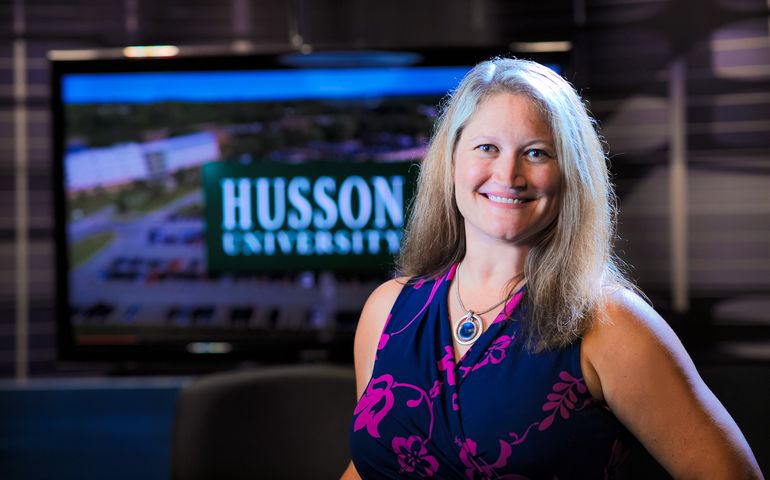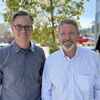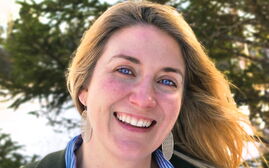Processing Your Payment
Please do not leave this page until complete. This can take a few moments.
- News
-
Editions
View Digital Editions
Biweekly Issues
- December 15, 2025
- December 1, 2025
- Nov. 17, 2025
- November 03, 2025
- October 20, 2025
- October 6, 2025
- + More
Special Editions
- Lists
- Viewpoints
-
Our Events
Event Info
Award Honorees
- Calendar
- Biz Marketplace
Women to Watch: At Husson University, Marie Hansen is training students for jobs of the future
 Fred Field
“Having a strong understanding of technology is becoming an essential skill for all students,” said Marie Hansen, dean of Husson’s College of Business
Fred Field
“Having a strong understanding of technology is becoming an essential skill for all students,” said Marie Hansen, dean of Husson’s College of Business
Spearheading plans for a new College of Business building at Bangor’s Husson University, Marie Hansen had a vision.
The dean of the College of Business and of the New England School of Communications sought to create a space that would facilitate synergy between students, faculty, business and technology.
“Synergy” sums up Hansen’s mantra. Arriving at Husson in 2003 with extensive educational and legal experience, the Bangor native leads educational partnerships between companies and Husson, recruits local leaders to share insights, donates expertise to the community, assists the professional development of fellow employees, promotes new and existing degrees for an educated workforce, and works with high schools to form business programs with Husson.
The $17.5 million College of Business building, opening in August, is a pivotal moment. Housing the schools of accounting; business and management; hospitality; sport and tourism management; legal studies; and technology and innovation, the centerpiece will be the new iEX (interactive experience) Center and the creation of a new XR (extended reality) degree program, using cutting-edge resources designed for real-world problem-solving in a fast-growing field.
The goal? Enhance regional economic development by training students for jobs of the future.
Mainebiz: Collaboration is important to you. Why?
Marie Hansen: I work with students, but I also work with faculty and other professionals to grow their strengths, their scholarship, their interactions. I have the opportunity to reach out to businesses and look at how to make Maine a strong economic environment and how to help businesses grow. My method for doing that is to use the strengths of everyone on my team to deliver leadership and training to business.
MB: How do you develop partnerships?
MH: One example is Jackson Laboratory. They’re a long-time partner. We went to them and developed customized education and degree programs. We have interns from our student population go there, which helps their recruitment. That partnership evolves with their needs.
MB: You seem like a natural convener of people. Do you view yourself that way?
MH: I do. That’s what I enjoy most — bringing different players to the table and asking queisotns.
MB: What’s the latest question you and your team are exploring?
MH: We’re launching the iEX center. Our students will be able to create virtual reality simulations that help solve problems. For example, students studying criminal justice can create a mock crime scene in a simulated environment.
MB: How does this capability help the larger community?
MH: We’ll be looking for problems from the community that our students can get involved in. For example, we can create a simulation that trains people in customer service. We want our students to learn skills that are practical and that they are prepared to take into the workforce. And we want the community and employers to come to us for help if they need it.
MB: How unusual is virtual reality capability as an academic tool?
MH: This virtual reality set-up is definitely unique for New England. Other places teach virtual reality, but often through film schools or IT programs. The uniqueness for us is the fact that students are creating solutions, as opposed to just operating the equipment. They’re not just using a program that someone else wrote; they can write the program. This can be important for a variety of careers.
MB: How did it become apparent to you that Husson and the community would benefit from this type of facility?
MH: It’s important to be on the cutting edge of technology and really prepare our students for the jobs that don’t yet exist. Twelve years ago, social media marketing wasn’t a job. Five year ago, drone operator was not a job. UX, or user experience, was not a job: Today, it’s one of the top tech jobs. What guides us is, “Where are people going?” For me, that’s the fun. What’s out there? Where can this take us?
Husson University
1 College Circle, Bangor
Founded: 1898
Students she oversees: 1,529
Contact:
hansenm@husson.edu
husson.edu/college-of-business
husson.edu/nescom
Mainebiz web partners
Related Content

The Giving Guide
The Giving Guide helps nonprofits have the opportunity to showcase and differentiate their organizations so that businesses better understand how they can contribute to a nonprofit’s mission and work.
Learn More
Work for ME
Work for ME is a workforce development tool to help Maine’s employers target Maine’s emerging workforce. Work for ME highlights each industry, its impact on Maine’s economy, the jobs available to entry-level workers, the training and education needed to get a career started.
Learn More
Groundbreaking Maine
Whether you’re a developer, financer, architect, or industry enthusiast, Groundbreaking Maine is crafted to be your go-to source for valuable insights in Maine’s real estate and construction community.
Learn more-
The Giving Guide
The Giving Guide helps nonprofits have the opportunity to showcase and differentiate their organizations so that businesses better understand how they can contribute to a nonprofit’s mission and work.
-
Work for ME
Work for ME is a workforce development tool to help Maine’s employers target Maine’s emerging workforce. Work for ME highlights each industry, its impact on Maine’s economy, the jobs available to entry-level workers, the training and education needed to get a career started.
-
Groundbreaking Maine
Whether you’re a developer, financer, architect, or industry enthusiast, Groundbreaking Maine is crafted to be your go-to source for valuable insights in Maine’s real estate and construction community.
ABOUT
NEW ENGLAND BUSINESS MEDIA SITES
No articles left
Get access now
In order to use this feature, we need some information from you. You can also login or register for a free account.
By clicking submit you are agreeing to our cookie usage and Privacy Policy
Already have an account? Login
Already have an account? Login
Want to create an account? Register
Get access now
In order to use this feature, we need some information from you. You can also login or register for a free account.
By clicking submit you are agreeing to our cookie usage and Privacy Policy
Already have an account? Login
Already have an account? Login
Want to create an account? Register









0 Comments